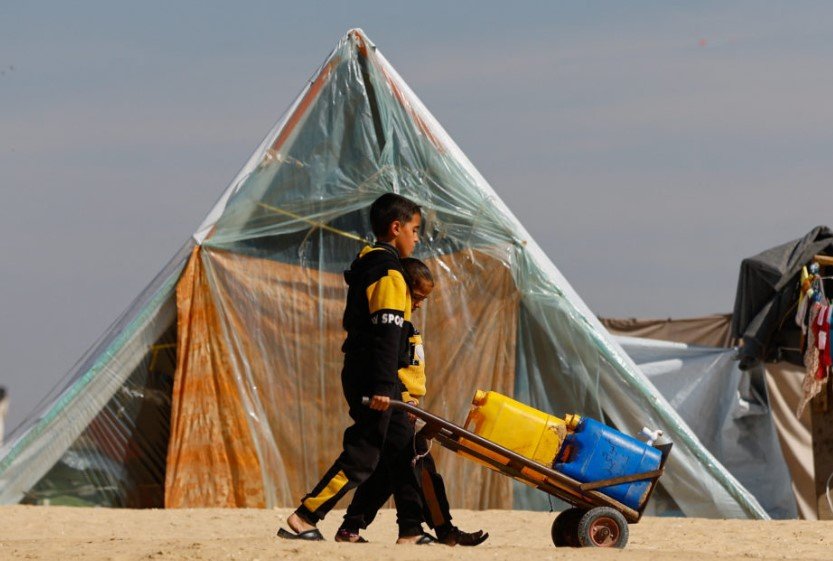Defense Minister’s remarks fuel fears of forced relocation; Trump backs “voluntary” migration idea
Israel’s government is weighing controversial plans to push hundreds of thousands of Palestinians into a closed buffer zone near the Egyptian border, raising alarms over potential forced displacement amid a devastating war that has left much of Gaza in ruins.
The remarks, attributed to Israeli Defense Minister Yoav Gallant and reported in local media this week, mark the latest signal that Israel is moving beyond short-term military goals and toward long-term demographic engineering in the Gaza Strip — a territory already teetering under the weight of collapse.
A “humane separation” or mass expulsion?
Defense officials in Jerusalem insist the goal is to isolate civilians from Hamas fighters, particularly in Gaza’s central and northern districts where hostilities continue to rage. According to reports cited by Israel’s Channel 12 and Haaretz, the plan would confine Palestinian civilians to a sealed “humanitarian zone” in southern Gaza, close to the Rafah crossing.
It would be fenced off, tightly monitored, and accessible only with Israeli coordination.

One paragraph from Gallant’s internal briefing, according to leaks, referred to the effort as a “humane separation strategy.” But to many Palestinians and rights advocates, there’s nothing humane about it. And it’s not just activists raising red flags.
Senior officials in Egypt and Jordan have already expressed quiet fury, warning that any attempt to move large swaths of Gaza’s population toward their borders could trigger wider regional instability. The UN has called it “deeply troubling.”
Living conditions already unbearable in southern Gaza
Even before this latest plan, southern Gaza has borne the brunt of Israel’s months-long military campaign. Hospitals are overwhelmed. Water is scarce. Makeshift tents sprawl across former agricultural land. Electricity is almost non-existent.
And now, hundreds of thousands more people could be crammed into the same shrinking space.
• The Gaza Strip’s population was estimated at 2.1 million before the war
• More than 1.7 million are currently displaced, according to UNRWA
• Rafah — the proposed “closed zone” — has already seen intense bombing
As one aid worker from Médecins Sans Frontières put it, “This is not relocation. This is compression — with no exit.”
Trump administration signals support for emigration
Adding fuel to the fire, U.S. President Donald Trump has signaled support for what his aides describe as a “voluntary emigration initiative” for Gazans — a stance that has drawn heavy backlash from international legal experts.
During his brief remarks at a press availability on Monday, Trump said, “If they want to leave, let them leave. We’ll help them. We’ll find places for them.” He added that the White House was working with unnamed “third countries” to explore resettlement programs.
No country has publicly agreed to accept Palestinians en masse.
In fact, several EU and Arab League members have explicitly rejected any notion of population transfer. A leaked EU Council memo last week described the idea as “tantamount to ethnic cleansing,” citing international humanitarian law and the Fourth Geneva Convention.
Diplomats grow wary as ceasefire hopes fade
For weeks, U.S. and Qatari mediators had hinted at an emerging Gaza ceasefire deal involving phased hostilities, hostage releases, and reconstruction promises. But the atmosphere soured this week after Netanyahu’s unannounced White House exit and Washington’s silence on new border plans.
Special envoy Steve Witkoff delayed his trip to Doha on Tuesday, a move widely interpreted as a sign that talks are on ice. Meanwhile, a senior Israeli official speaking anonymously said, “we will do what we must, with or without American applause.”
That quiet rift — between Israel’s military plans and U.S. diplomatic optics — is becoming harder to paper over.
Data shows most Gazans don’t want to leave
Despite Israeli claims that Palestinians will be given the “option” to emigrate, independent polling suggests that few Gazans would willingly abandon their land, even in dire conditions.
Here’s a quick breakdown from a June 2025 poll by the Palestinian Center for Policy and Survey Research:
| Question | Percentage of Respondents |
|---|---|
| Do you want to permanently leave Gaza? | 17% |
| Would you relocate temporarily if conditions improve? | 32% |
| Do you support a long-term buffer zone policy? | 8% |
One sentence from the report stood out: “Despite extraordinary hardship, a significant majority of Palestinians continue to view Gaza as their home — not a transit station.”
Warnings of a “second Nakba”
For many Palestinians, this feels hauntingly familiar. The term “Nakba,” meaning catastrophe, refers to the mass displacement that followed the creation of Israel in 1948. Now, nearly eight decades later, people worry history is repeating itself — only this time, in slow motion.
“It’s ethnic cleansing by policy paper,” said Lina Abu Marouf, a Gazan teacher now sheltering in a tent outside Khan Younis. “You bomb our homes, cut off aid, trap us, and then offer us an escape. That’s not a choice.”
The international legal community, too, is beginning to speak more bluntly. Human Rights Watch called the Israeli plan “coercive displacement under the fog of war.” Meanwhile, Amnesty International warned that any state participating in resettlement plans “could be complicit in violations of international law.”
Egypt tightens border, but keeps options open
So far, Egypt has not opened its border to mass refugee flows, though it continues to allow a limited number of humanitarian cases and dual nationals through Rafah. Cairo, caught between public anger and diplomatic tightropes, has sent mixed messages.
Privately, though, Egyptian officials have reportedly told Washington they will not cooperate with any long-term transfer plans. The mood is tense. Regional capitals are watching closely. So is the Arab street.
This might still be a proposal, but the consequences could be very real — and very permanent.
